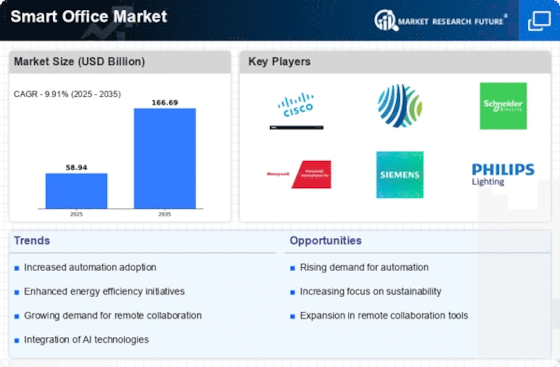Top Industry Leaders in the Smart Office Market

The Competitive Landscape of the Smart Office Market
The modern office is undergoing a dramatic metamorphosis, shedding its paper-strewn skin and embracing the sleek, interconnected world of the smart office. This dynamic market, brimming with sensors, software, and intelligent automation, promises enhanced efficiency, productivity, and employee well-being. But navigating this competitive landscape requires a clear understanding of the key players, adopted strategies, and factors influencing market share.
Key Player:
- Siemens AG
- Schneider Electric SA
- Johnson Controls International PLC
- Honeywell International Inc.
- ABB Ltd.
- Cisco Systems, Inc.
- United Technologies Corporation
- Lutron Electronics Co. Inc.
- Crestron Electronics, Inc.
- Philips Lighting Holding B.V
Strategies Adopted by Leaders:
- Focus on specific applications and verticals: Targeting niche applications like meeting room optimization or employee well-being solutions fosters expertise and brand recognition.
- Strategic partnerships and acquisitions: Partnering with other smart office technology providers, furniture manufacturers, or real estate developers accelerates market reach and broadens solutions.
- Cloud-based platforms and subscription models: Providing cloud-based platforms and flexible service models reduces upfront costs and increases accessibility for smaller businesses.
- Emphasis on data analytics and AI: Integrating data analytics tools and AI capabilities optimizes energy usage, space allocation, and employee experience.
- Providing comprehensive support and training: Robust support channels and training programs ensure smooth implementation and maximize user satisfaction with smart office technologies.
Factors for Market Share Analysis:
- Comprehensive solutions and integration: Offering interconnected systems encompassing various smart office technologies differentiates solutions and expands value proposition.
- Openness and interoperability: Supporting industry standards and various device protocols ensures seamless integration and avoids vendor lock-in.
- Data security and privacy: Robust data security measures and transparent privacy practices build trust and compliance with regulations.
- User-friendliness and adaptability: Intuitive interfaces, easy configuration, and customization options enhance user adoption and cater to diverse workplace needs.
- Cost-effectiveness and ROI: Balancing advanced features with competitive pricing and clear demonstration of return on investment attracts wider market adoption.
New and Emerging Companies:
- Lutron: Specializes in advanced lighting control systems that enhance energy efficiency and improve employee comfort.
- Control4: Focuses on customizable smart home and office automation solutions with intuitive interfaces and voice control capabilities.
- Crestron: Offers high-end home and office automation solutions for demanding clients, integrating complex audio-visual, lighting, and security systems.
- Wavve: Develops desk sensors and software that personalize workspace comfort and optimize office layout based on real-time employee utilization.
- Spacewell International: Provides data-driven workplace management solutions, analyzing space usage and employee behavior to optimize office design and efficiency.
Latest Company Updates:
Siemens AG:
- October 2023: Siemens launches Desigo CC, a next-generation building management system offering AI-powered optimization for energy efficiency, occupant comfort, and space utilization.
- August 2023: Siemens partners with Microsoft to develop cloud-based smart office solutions that integrate Azure IoT and Siemens MindSphere platforms.
Schneider Electric SA:
- November 2023: Schneider Electric introduces EcoStruxure MicroGrid, a smart microgrid solution for commercial buildings, enabling on-site energy generation and optimization.
- September 2023: Schneider Electric partners with Google to integrate its Wiser smart home devices with Google Assistant, offering voice control for lighting, temperature, and other smart office features.









